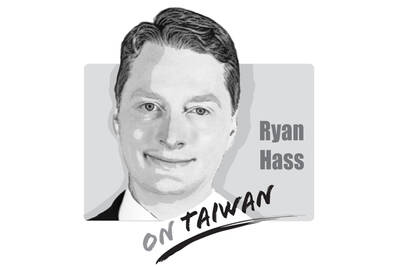The chief executive of Lloyds is the last man standing among the banks that bore the brunt of the financial crisis.
Three years ago, Eric Daniels was busy cementing Lloyds’ reputation as something of a boring bank, reporting its first dividend increase in five years on the back of a steady rise in profits.
However, his business was plunged into the maelstrom when the deal to rescue HBOS — famously sealed at a cocktail party — left Lloyds bloated with toxic debt. Lloyds’s chairman, Sir Victor Blank, paid for that deal with his job as the bank took recourse to the taxpayer for funds.
Though Daniels, who was deeply involved in the HBOS rescue as well, has managed to hang on, determined to prove that the takeover would ultimately turn out to be a sound move. Last week, revealing half-year profits of £1.6 billion (US$2.5 billion) and a halving of bad debts, he was looking more secure.
Unlike Andy Hornby, a retailer who was hired by HBOS for his marketing skills, Daniels is a lifelong banker who had 25 years at Citibank under his belt before joining Lloyds in 2001. He is said to understand the ”plumbing” of the industry like few others and is well-regarded among fellow bankers.

There has been much catastrophizing in Taiwan recently about America becoming more unreliable as a bulwark against Chinese pressure. Some of this has been sparked by debates in Washington about whether the United States should defend Taiwan in event of conflict. There also were understandable anxieties about whether President Trump would sacrifice Taiwan’s interests for a trade deal when he sat down with President Xi (習近平) in late October. On top of that, Taiwan’s opposition political leaders have sought to score political points by attacking the Lai (賴清德) administration for mishandling relations with the United States. Part of this budding anxiety
The diplomatic dispute between China and Japan over Japanese Prime Minister Sanae Takaichi’s comments in the Japanese Diet continues to escalate. In a letter to UN Secretary-General Antonio Guterres, China’s UN Ambassador Fu Cong (傅聰) wrote that, “if Japan dares to attempt an armed intervention in the cross-Strait situation, it would be an act of aggression.” There was no indication that Fu was aware of the irony implicit in the complaint. Until this point, Beijing had limited its remonstrations to diplomatic summonses and weaponization of economic levers, such as banning Japanese seafood imports, discouraging Chinese from traveling to Japan or issuing
On Nov. 8, newly elected Chinese Nationalist Party (KMT) Chairwoman Cheng Li-wun (鄭麗文) and Vice Chairman Chi Lin-len (季麟連) attended a memorial for White Terror era victims, during which convicted Chinese Communist Party (CCP) spies such as Wu Shi (吳石) were also honored. Cheng’s participation in the ceremony, which she said was part of her efforts to promote cross-strait reconciliation, has trapped herself and her party into the KMT’s dark past, and risks putting the party back on its old disastrous road. Wu, a lieutenant general who was the Ministry of National Defense’s deputy chief of the general staff, was recruited
Tokyo-Beijing relations have been rapidly deteriorating over the past two weeks as China tries to punish Japan over Japanese Prime Minister Sanae Takaichi’s remarks about Taiwan earlier this month, and the off-ramp to this conflict is yet to be seen. Takaichi saying that a “Taiwan contingency” could cause a “situation threatening Japan’s survival” — which would allow Japan to act in self-defense — has drawn Beijing’s ire and sparked retaliatory measures. Her remark did not gain public attention until Chinese Consul General in Osaka Xue Jian (薛劍) made an apparent threat to behead her. The two sides lodged protests against each